October 4, 2023 - No. 57
Education in Ontario
Secondary School Teachers' Federation Announces Results of Vote
on Interest Arbitration
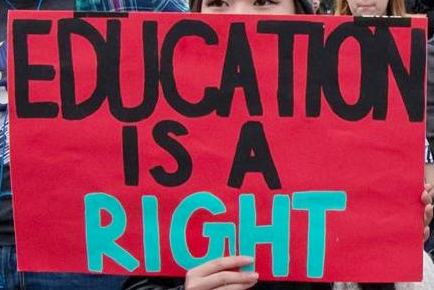

• Test Results Used to Push Narrative that
Strikes
Undermine Public
Health
Britain
• Unrelenting Fight Against Assaults on
Education,
Students, Faculty and
Staff
Education in Ontario
Secondary School Teachers' Federation Announces Results of Vote on Interest Arbitration
On September 27, the Ontario Secondary School Teachers' Federation (OSSTF) announced that of its members who voted, 78.4 per cent voted "in favour of a pathway for negotiations" in their current dispute with the Ontario government over wages and working conditions which are also the students' learning conditions. This involves giving up the legal right to strike in this round of negotiations and having it replaced with binding interest arbitration. A remedy for wage suppression by the government using Bill 124 is also stipulated. Binding Interest Arbitration also covers any outstanding central table matters that remain after the agreed timeline for central negotiations ends on October 27.[1]
Local bargaining across the province will continue until March 28, 2024, at which time all remaining items that have not been settled between the union and local school boards will also be sent to arbitration.
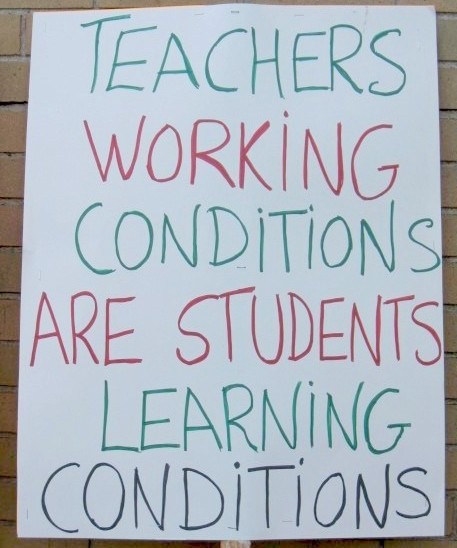 In announcing the
results, OSSTF President Karen Littlewood stated:
In announcing the
results, OSSTF President Karen Littlewood stated:
"We are proud to announce that after a three-week long vote, open to all Members in the school board sector, OSSTF/FEESO members have voted to approve a proposal that will put all unresolved items before an independent, third-party arbitrator. Premier Ford can't be trusted. For over 14 months, we have tried to engage the Ford government in good faith bargaining but we haven't had a partner at the table that cares about safeguarding our public education system. Now we have the opportunity to bypass traditional bargaining pathways to secure a fair collective agreement.
"After five years of underfunding and underspending under the Ford administration, our top priority is to get the best possible deal for OSSTF/FEESO Members while working to protect public education in Ontario. Learning and working conditions across the province have deteriorated under the Ford government, staffing and retention have languished, and students are unable to access the supports and resources they need to succeed as a result of this government's deliberate underfunding of education and shortchanging of students. We cannot allow this to continue.
"I want to thank all OSSTF/FEESO Members who participated in the membership vote, those who shared information with their colleagues, and the thousands who attended one of our 30 informational meetings held all across the province. Together, we are striving for the best possible outcome for our Federation."
In response to the vote, the Ford government's Minister of Education Stephen Lecce stated:
"I am very pleased that the members of the Ontario Secondary School Teachers' Federation have voted in favour of this deal that keeps kids in class. We came together to put 400,000 English public high school students first, and as a result, a student who started high school last year will now graduate in three years without the threat of strikes. This will allow students to focus on their studies as our government ensures school boards get back to basics.
"This is a significant step forward in providing stability for high school students. I believe strongly that every student deserves this certainty."
Continuing the mantra that delays in negotiations are caused by the teacher's unions, not the refusal of government to negotiate, the Minister added:
"With the approval of this agreement, I am calling on all outstanding education unions to reach a deal and end the delay. Nothing should matter more than students being in class and benefiting from uninterrupted learning for the next three years, with an enhanced focus on reading, writing and math."
As background information, the Minister's press release stated that "The OSSTF's decision to vote in favour of an agreement that would preclude strikes during this round of negotiations reaffirms our joint commitment to the success and well-being of Ontario students." (WF emphasis.)
 The Minister's statement shows how the government is using the vote to
claim that it proves its commitment to the success and well-being of
Ontario students, while the union claims that the pathway accepted is a
way around the government's refusal to negotiate in good faith, which
is harming the
success and well-being of Ontario students.
The Minister's statement shows how the government is using the vote to
claim that it proves its commitment to the success and well-being of
Ontario students, while the union claims that the pathway accepted is a
way around the government's refusal to negotiate in good faith, which
is harming the
success and well-being of Ontario students.
What is not being discussed openly are the actual conditions in the schools and what is required to affirm the right of the youth to an education that prepares them for the 21st century. The public and educators are left to "pick a side" and this deprives them of any say over the matter, or any way to participate in working out what is what and what is required. Now that the vote is over, the very limited participation in the voting process is not mentioned either, in order to show unity behind the union's position. According to the process, it is now all to be left to the two parties to work things out and eventually to an arbitrator.
What the situation in fact reveals is that in the coming period it will be important for teachers and education workers to speak for themselves about what their vote meant so as to make their intentions clear. It is critical that, despite the interpretation of the various parties involved about the vote, those who voted, or did not vote, continue to speak out about the conditions in the schools which continue to be untenable.
Note
1. "Members approve pathway to resolve school board bargaining," OSSTF/FEESO, September 27, 2023.
Test Results Used to Push Narrative that Strikes Undermine Public Health
On September 28, the day after the announcement of the results of the vote by members of the Ontario Secondary School Teachers' Federation (OSSTF) on the binding interest arbitration pathway, the provincial government issued a press release responding to the Education Quality and Accountability Office (EQAO)'s "annual student assessment results." The results are scores on standardized math and literacy tests in K-12 education taken by students the previous year, in this case 2022-23. The government claims that reported gains in reading, writing and math scores are all due to its "unwavering focus on keeping kids in class with a back-to-basics education." Of course information of what the improvements were and their cause is not the goal of the government's press release, but rather to use it to push a self-serving narrative.
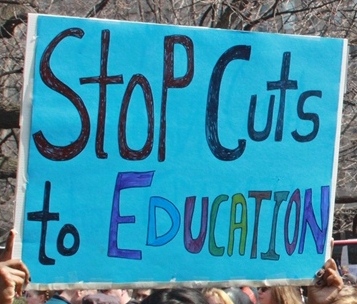
Based on Education Minister Stephen Lecce's comments about the need for other education unions to follow the OSSTF's pathway of giving up the right to strike and opting for voluntary binding interest arbitration, "the work" being proposed is getting the other education unions to give up their right to strike, either voluntarily or by threatening to use force.
Later on the press release states that "As EQAO results show, the government continues to make the case that stable in-person learning, with a renewed focus on literacy and STEM [science, technology, engineering and mathematics] education will lead to positive mental, developmental, physical health [emphasis added] and long-term academic success. Ontario is ensuring students are graduating with foundational skills for the jobs of tomorrow."
The language used is a significant red flag as it indicates the government is actually trying to make the case that strikes -- for which its preferred term is "disruptions" -- undermine the "mental, developmental and physical health" of students. The case it wants to make is that teachers and education workers should have their right to strike violated because their collective actions represent a danger to public health, in this case the "mental, developmental and physical health" of the youth.
Courts have ruled that the most significant criterion for a government declaring workers essential is that if they were to strike it would endanger public health. This position of the government comes at a time it is making egregious cuts to education that all those working in the schools know are violations of the right of the youth to an education and the supports they require to grow healthy in body and mind. The levels of need in the schools far outstrip what is funded and it is educators who are left to try and meet these needs without the resources to do so, which is unsustainable. The government's spin-doctoring of this serious issue is self-serving and shameless to say the least.
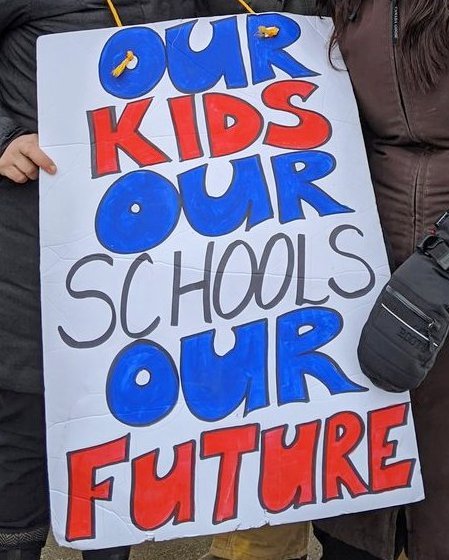 This
discourse must be challenged by everyone as it shows the government's
real aim, which is to continue undermining public education by
eliminating the ability of those on the front lines of its
implementation to say No! up to and including
through strike
action. Those teachers and
education workers who voted in favour of OSSTF's proposal for binding
interest arbitration did not do so because they believe having the
right to strike harms the youth. Far from it! Many do not trust the
government to uphold any standards either in contract negotiations or
in education as a whole.
Many did not vote because they refuse to give up the right to strike
but nonetheless hope that binding arbitration will permit a way forward
in the face of the government's intransigence. This is the argument
they were presented with by their union and the vote result gives the
union the opportunity
to try out this method of sorting out the government's refusal to
negotiate.
This
discourse must be challenged by everyone as it shows the government's
real aim, which is to continue undermining public education by
eliminating the ability of those on the front lines of its
implementation to say No! up to and including
through strike
action. Those teachers and
education workers who voted in favour of OSSTF's proposal for binding
interest arbitration did not do so because they believe having the
right to strike harms the youth. Far from it! Many do not trust the
government to uphold any standards either in contract negotiations or
in education as a whole.
Many did not vote because they refuse to give up the right to strike
but nonetheless hope that binding arbitration will permit a way forward
in the face of the government's intransigence. This is the argument
they were presented with by their union and the vote result gives the
union the opportunity
to try out this method of sorting out the government's refusal to
negotiate.
It is now critical that the government not be permitted to use the OSSTF vote to claim a mandate for any moves to limit the right to strike in education in the name of protecting the health of Ontario's youth.
Britain
Unrelenting Fight Against Assaults on Education, Students, Faculty and Staff
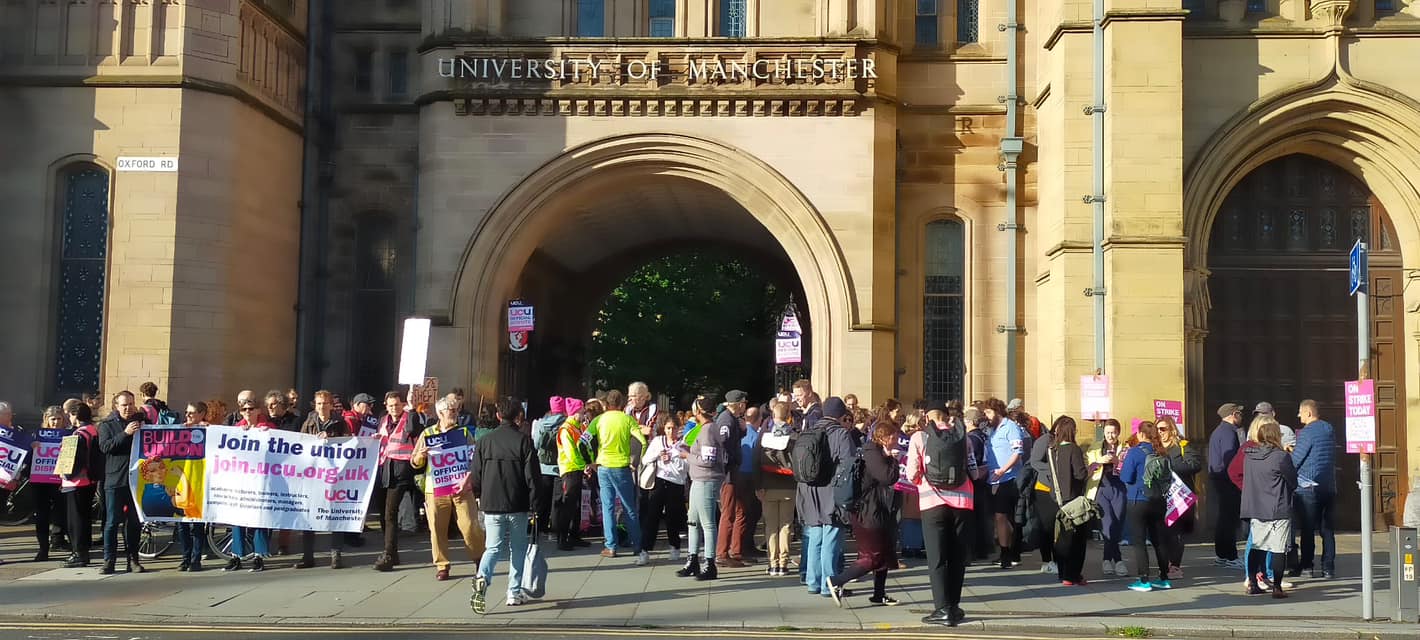
Picket line at University
of Manchester, September 27, 2023.
Academic Year Begins with More University Strikes
In their latest round of action over pay and working conditions so as to safeguard the future of higher education, university staff across Britain went on strike for five consecutive days from September 25 to 29.[1]
The dispute centres on low pay and bad working conditions which are at the heart of the anti-social offensive whose aim is to restructure the state in favour of narrow private interests. The University and College Union (UCU) pointed out that the employer body, the Universities and Colleges Employers' Association (UCEA), has imposed a pay increase for 2023/24 worth just five per cent for most UCU members, even though they overwhelmingly voted to reject it. UCU is also demanding action on gig-economy employment practices and high workloads.
According to research by the union, the higher education sector made more money than ever last year, yet the claim of employees fell to a record low.
Nationwide strike ballots at 143 universities also began on September 19, following the rejection of the five per cent offer. This is the third such ballot this year. As the union explains, a successful ballot will renew the strike mandate into 2024.[2]
The union also points out that lecturers' actions have forced employers to negotiate over workloads and job security for the first time. Meanwhile, the UCU has ended its marking and assessment boycott, which had been ongoing since April 20.
Covering all marking and assessment at 145 universities, the boycott was met by an up to 100 per cent decrease in pay for participating staff at a number of institutions. This disproportionate, punitive, and probably illegal response by management was an aggressive tactic aimed at intimidating workers into backing down.[3] University of Sheffield staff went on strike for ten days over this pay issue following the boycott.
UCU regional official Julie Kelley said: "The brutal pay docking regime Sheffield's management is enforcing means a staff member with a single unmarked essay could lose a month's wages. Attacking staff like this only adds fuel to the fire and will do nothing to bring this dispute to an end. Sheffield needs to stop the pay docking and call on UCEA to re-enter negotiations."[4]

Oxford Brookes picket
line September 25, 2023, first day of five-day strike actions.
University of Brighton Cuts Staff Significantly
The University of Brighton announced in May its plans to cut over a hundred staff members, resulting in a significant reduction in lecturers across various subjects, citing "cost savings" of £17.9m, despite having spent more than £50m on building projects in the past two years. Local UCU members voted to take industrial action, with the university's higher education committee subsequently voting for the university to be greylisted, which is the union's ultimate sanction.
The UCU asked its members, other trade unions, labour movement
organizations and the international academic community to support its
members at Brighton by not applying for advertised jobs, not speaking
at or organizing conferences outside of contract, not accepting new
positions as visiting
professors or researchers, not accepting invitations to write for
academic journals, not accepting new contracts as external examiners
for taught courses, and refusing to collaborate on new research
projects outside of contract.[5]
Goverment "Crackdown on Poor Quality University Courses"
An egregious "crackdown on poor quality university courses" was unleashed by British Prime Minister Rushi Sunak on July 17 which typifies this government's assault on academic standards, on academic staff and students. At the University of Chichester it is also an assault on students and professors of African and Caribbean history which helps students to think for themselves on the basis of their own thought material, not through the lens of British imperialism.
|
The University of Chichester suspended recruitment for the masters by research (MRes) course on African History and the Diaspora and made its program leader Professor Hakim Adi redundant. Professor Adi is a world-leading expert in the History of Africa and the African Diaspora and the first person of African descent to become Professor of History in the UK. It is a thinly veiled racist attack aimed at disempowering students of African and Caribbean heritage, many of them mature students, who come forward to train as historians.
The University also dismissed a colleague of Professor Adi, Dr. Dion Georgiu. A vigorous campaign has been launched by students and colleagues and by wide sections of concerned people, in the midst of disinformation and high-handedness from the University.[6]
A letter to the press from ten MRes graduates points out: "As MRes graduates, spreading this disinformation does a disservice to our discipline, to the culmination of our hard work and the work of Professor Hakim Adi. It also jeopardizes our ongoing challenge, to uphold the course and the rights of the students and Professor Hakim Adi to fair treatment." What the University of Chichester is seeking to accomplish amounts to an attack on all academia, Professor Adi emphasized in an online press conference.
 These attacks are coming in the context of the government's
socalled "crackdown on poor quality university courses." The Financial
Times reported:
"Universities in England offering courses with poor employment
prospects and high student dropout rates will be subjected to stricter
regulatory controls under plans to be unveiled ... by Prime Minister
Rishi Sunak. The government will order the Office for Students, the
higher education regulator in England, to do more to limit the number
of students that universities can recruit on to certain courses. The
prime minister and
education secretary Gillian will promise a crackdown on 'rip-off degree
courses' which leave graduates with inadequate pay and high debts."[7]
These attacks are coming in the context of the government's
socalled "crackdown on poor quality university courses." The Financial
Times reported:
"Universities in England offering courses with poor employment
prospects and high student dropout rates will be subjected to stricter
regulatory controls under plans to be unveiled ... by Prime Minister
Rishi Sunak. The government will order the Office for Students, the
higher education regulator in England, to do more to limit the number
of students that universities can recruit on to certain courses. The
prime minister and
education secretary Gillian will promise a crackdown on 'rip-off degree
courses' which leave graduates with inadequate pay and high debts."[7]
According to the government's logic, the point of degree courses is to fit the graduates with the ability to earn large salaries and pay off the debt incurred while at university. The irony of this can be seen in the present struggles, where "inadequate pay and high debts" is the norm for higher education workers, not to mention the graduates.
The struggle of higher education workers, both academic and support staff, is aimed at recognizing and realizing the value they add to the economy. They produce highly skilled graduates and postgraduates, contribute to society's cultural level, and contribute to scientific and technological advances. It is a fight for the future of higher education. Education is a right that should serve the people, and academics and workers are fighting for their rights and conditions.
By holding the line against imposition and intimidation, higher education workers have forced negotiations on certain key issues. Tactics, such as attempting to block workers from organizing in self-defence, themselves reveal that it is an issue of control over the direction society is headed. Through their stand, university workers are contributing to a new outlook where people can think and act in their own name, allowing them to take control over matters that affect their lives and the general interests of society.
Notes
1. "Start of university term to be hit with five days of UK-wide strikes," UCU, 6 September 2023
2. "Date set for university strike ballot," UCU, 11 September 2023
3. "University Staff to Strike against Arbitrary Full Pay Docking," Workers' Weekly, June 10, 2023
4. "Ten days of strikes set to hit the University of Sheffield over pay docking row," UCU, 15 September 2023
5. "Start of university term to be hit with five days of UK-wide strikes," UCU, 6 September 2023
6. For full details of the closure of the course, the sacking of Professor Adi, and the campaign to save the MRes in the History of Africa and the African Diaspora, and Professor Hakim Adi's post at the University of Chichester, see the History Matters website.
7. "Rishi Sunak announces crackdown on 'poor quality' university courses", Financial Times, 17 July 2023
(Workers' Weekly. Photos: UCU Rising and WW)
(To access articles individually click on the black headline.)
Website: www.cpcml.ca Email: editor@cpcml.ca


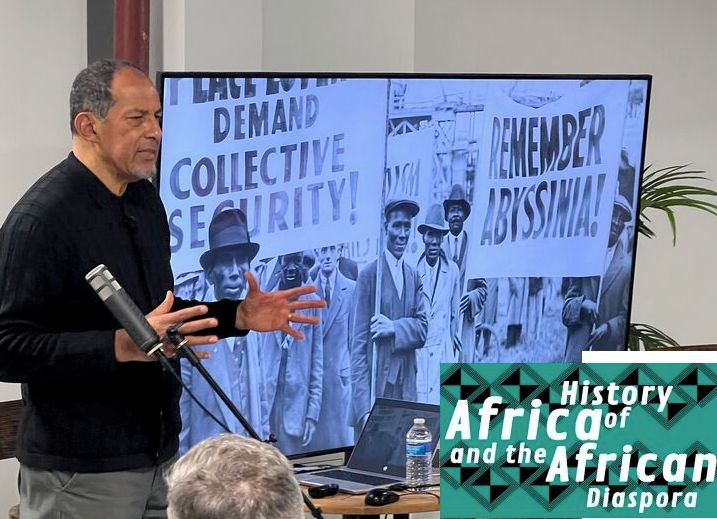 Professor
Hakim Adi speaking on history of Africa and African diaspora
Professor
Hakim Adi speaking on history of Africa and African diaspora